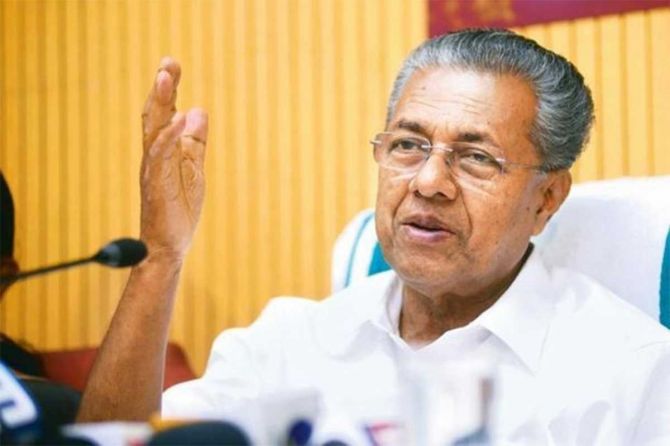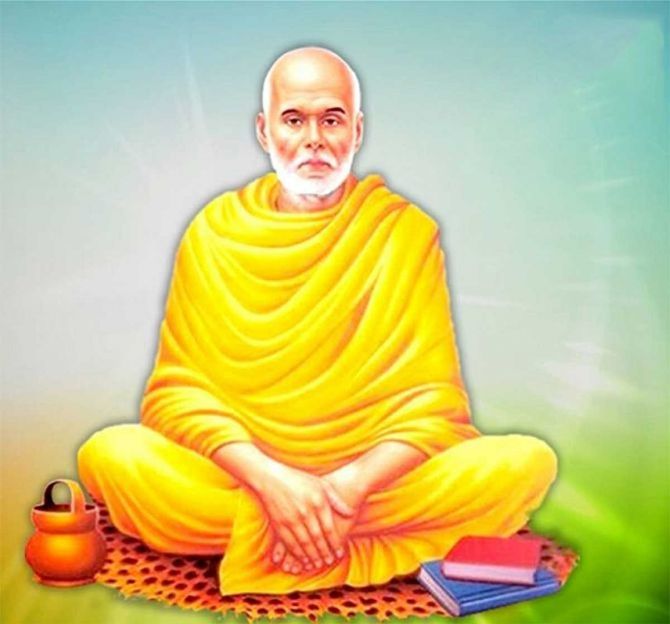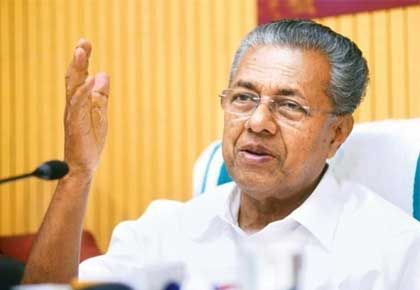'This will be the first open university in Kerala and it is a great tribute to Gurudevan by the helmsman of the Communist movement in Kerala,' observes Ambassador M K Bhadrakumar.

Pinarayi Vijayan's historical legacy in over five decades in public life will surely have at its epicentre the establishment of an open university named after Sree Narayana Guru (external link).
Announcing the decision (external link), Pinarayi tweeted that Gurudevan 'enlightened an era' and the university will take inspiration from him 'to serve our society.'
This will be the first open university in Kerala and it is a great tribute to Gurudevan by the helmsman of the Communist movement in Kerala.
Gurudevan created a revolutionary climate in this stagnant part of India with his espousal of equality, justice and the virtues of unity and 'organisation'.
The social currents that Gurudevan engendered provided fertile ground to the socialist ideals in the 1940s and the communist party's roots began running deep in that soil, inevitably.
The rest is history.
Gurudevan placed education as the greatest asset that humankind should aspire for.
I can only recall what my late mother, who was a great disciple of Gurudevan, used to din into her children's ears -- 'You can be dispossessed of everything else in life except your education, therefore, make the most of the opportunities to acquire knowledge.'
Millions of Malayalis from the communities that were historically downtrodden took the path of enlightenment that Gurudevan opened for them.
Every time I visited Kerala on home leave while serving in the Indian Foreign Service, my mother unfailingly used to take me to the Sivagiri Mutt (external link) and we used to spend a day there praying at Gurudevan's samadhi and simply sitting and meditating there in the ashram till dusk fell.
The orchard used to have inscriptions of Gurudevan's sayings.
Each and every one of them was profound in its meaning.
Some are famous and need no iteration:
One Caste, One religion, One God for Mankind.
Don't ask, don't say, and don't think about caste.
No matter what religion, it suffices if it makes you a better man.
Religion is a means to realise God, it is not God.
The one saying of Gurudevan that influenced me most was, of course, his exhortation, Progress through Education & Strength through Organisation.
Gurudevan emphasised education and social bonding as the key assets in life's arduous journey toward emancipation in a challenging milieu of social oppression and caste prejudices and discrimination.
The higher educational institutions that came up under the supervision of R Shankar (external link), well-known statesman and former chief minister of Kerala, in the 1950s and 1960s played a seminal role in the upliftment of the Ezhava community.
Today, there is hardly any Ezhava family in the entire southern Kerala belt around Kollam and Varkala that doesn't have post-graduates.
I have heard from my mother that some of the families, including that of an uncle of mine C. Kesavan (external link), who was also a chief minister, were involved in vocations like weaving for livelihood as recently as in the early part of the last century.
When I passed my MA exam as rank holder in 1971, R Shankar who was a close friend of my father, phoned him and said I should start my 'career' in the Sree Narayana College at Kollam.
Shankar said, 'I know him from childhood, and I also know he's going to join the IAS. That's why I want to him to work for a month in Sree Narayana College.'
As the ultimate clincher, Shankar added, 'Gurudevan will be very pleased.'
So, I reported for work the next week at Kollam as a lecturer!
I have no doubt in my mind that Gurudevan was immensely pleased when eventually I became the first person from my community to join the Indian Foreign Service with a high rank in the merit list in my very first attempt at the age of 22.

On the eve of the announcement on the proposed open university, Pinarayi made certain thought-provoking observations about Gurudevan's 'ideology'.
Pinarayi said Gurudevan's uniqueness lies in that he put man first in everything he said and did. This is indeed so.
And it's a timely reminder too that a concerted attempt has been going on lately to portray Gurudevan as an other-worldly advocate of Advaita philosophy.
The heart of the matter is that Gurudevan tried to find practical solutions to man's deprivations and suffering in this world -- through education, healthy life, trade and other vocations and so on.
His preoccupations were largely about man's present-day problems in life, not about the soul's transmigration.
Pinarayi said, 'Both Narayana Guru and Sankaracharya (external link) were advocates of Advaita philosophy (external link).'
But what was different about Narayana Guru is that he used Advaita for the betterment of human lives and not for sanctifying conservative values.
Narayana Guru tried to correct them and devoted his time to propose humane and practical propositions of progressive nature."
There is much truth in what Pinarayi said.
Curiously, Home Minister Amit Shah agrees with Pinarayi on this point.
In a tribute to Gurdevan on his 166th birth anniversary, Amit Shah wrote, 'The contribution of Narayana Guru towards the empowerment and education of the downtrodden are unforgettable.'
'His philosophy and advice would continue to brighten up the lives of people in the country.'
However, we should not overlook the spirituality that envelops Gurudevan's life and work, either.
Actually, there is no contradiction here -- that one could be a humanist and a spiritually-inclined person at the same time.
The problem arises when spirituality gets confused with religion.
Spirituality is about being a better and better human being.
It is a solo trip.
You don't have to put on the apparel of religion.
Whereas, humanism emphasises the value and agency of human beings, individually and collectively.
To my mind, Gurudevan comes nearest to Gautama Buddha in India's spiritual history.
Be that as it may, Pinarayi has taken on his shoulders a gigantic responsibility.
An open university that bears Gurudevan's name must provide a beacon light for decades to come.
It should be worthy of Gurudevan's proclamation that the progress of a society would be possible only through education.
Do not let vested interests erode the commitment undertaken that the open university will bring under one umbrella the distance education institutes in the state.
Equally, it cannot but be stressed that science subjects should be offered in the curriculum.
Gurudevan was a saint with a scientific temper.
Most important, Pinarayi should hand pick an enlightened mind to head the university at its inception.
To be sure, all sorts of pressure groups will be at work but the success of this historic project will largely depend on its navigator in its formative period.
Open university (external link) has great relevance for Kerala where mass literacy already exists, but economic compulsions compel young people to take up jobs to support their families, impeding the opportunity to pursue higher education.
One can easily anticipate lakhs of students enrolling in the open university if it is established with far-sightedness and progressive outlook.
Ambassador M K Bhadrakumar, who served the Indian Foreign Service for more than 29 years, is a frequent contributor to Rediff.com.
Feature Presentation: Ashish Narsale/ Rediff.com











